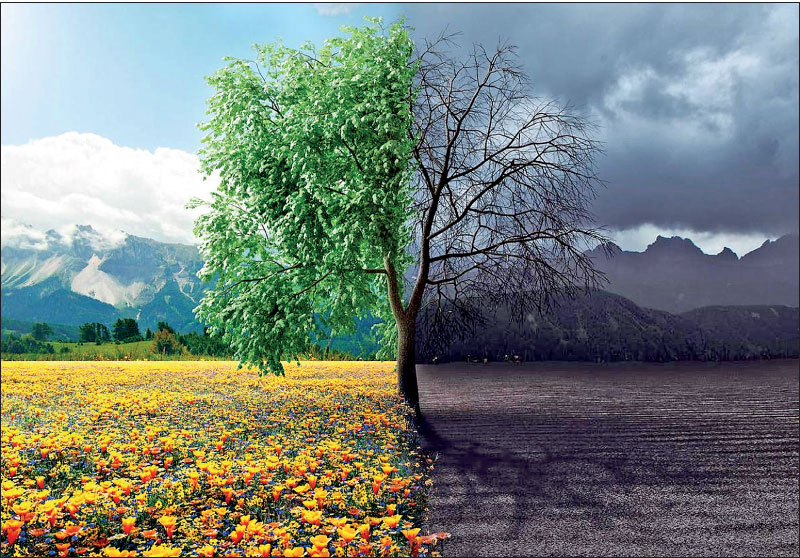Sunday Feb 22, 2026
Sunday Feb 22, 2026
Monday, 19 December 2022 00:45 - - {{hitsCtrl.values.hits}}

 The rate of change has accelerated in rapid shifts in many spheres. From a planetary pandemic we have been exposed to a perilous path of turbulence. As already predicted, with the continuation of the Ukraine war, the world will witness a recession. In such a context, a new term emerges to describe the shape of the new world, called BANI. Today’s column is all about a BANI world to assess whether it is an awesome fad or an awakened focus.
The rate of change has accelerated in rapid shifts in many spheres. From a planetary pandemic we have been exposed to a perilous path of turbulence. As already predicted, with the continuation of the Ukraine war, the world will witness a recession. In such a context, a new term emerges to describe the shape of the new world, called BANI. Today’s column is all about a BANI world to assess whether it is an awesome fad or an awakened focus.
Overview
We are now much familiar with a VUCA 1.0 reality (volatility, uncertainty, complexity, and ambiguity) with the required response, what I called as VUCA 2.0 (vision, understanding, confidence and agility). Jamais Cascio, an American anthropologist comes up with a refreshingly new world view, and he calls it the BANI world. As he argues, the world today is Brittle, Anxious, Non-Linear and Incomprehensible.
Jamais Cascio writes about the intersection of emerging technologies, environmental dilemmas, and cultural transformation, specialising in the design and creation of plausible scenarios of the future. His work focuses on the importance of long-term, systemic thinking, emphasising the power of openness, transparency and flexibility as catalysts for building a more resilient society. In 2017, the University of Advancing Technology awarded Cascio an honorary doctorate in recognition of his ongoing work.
In recent years, Cascio has developed scenarios and written analysis for the 2020 World Expo, a major European automaker (resulting in a significant change in strategy), the state of California, and the US Agency for International Development. Cascio’s work appears in various publications, including New Scientist, the Atlantic Monthly, The Bulletin of the Atomic Scientists, and Foreign Policy.
Enter the BANI world
I read a recent Forbes magazine article by Jeroen Kraaijenbrink with much interest with regards to the BANI world. As he explains, BANI says something about people and how they have mistakenly perceived the world up to now. In that sense, BANI should instead be seen as a correction, or a reality check, intending to shatter four illusions of humanity’s current perceptions of the world.
Brittle – The Illusion of Strength
Brittle means being fragile, breakable, while seeming firm. It refers to something that is not as strong as it seems. It is illusory strength, the belief that “everything will be alright” and the assumptions that “we all know are true,” except that they aren’t. Brittle refers to the myths that people tell themselves and each other to feel better and more secure.
The world has been around for eons, we tend to negate its indestructibility and durability because of its seemingly infinite lifespan. But it is fragile, and it has always been. The fact that people didn’t (want to) see this, and instead assumed that it was unbreakable, doesn’t change that. And that’s what this “new” concept really reveals: that people finally discover that the world, especially its nature, economy, and peacefulness is a fragile, convoluted interconnected ecosystem. Embracing Brittle means letting go this first illusion, the Illusion of Strength.
Anxious – The Illusion of Control
Anxiety refers to a feeling of helplessness, of being overwhelmed by everything that one faces. It comes with stress and worrying and a fear of not being able to cope with what the world asks—and not really knowing what will come in the first place, thereby making it hard or impossible to make the “right” decisions.
As Jeron observes, anxiety is largely a by-product of information. The more people hear and see, especially bad news, the more anxious they get. Because there’s only so much one can do. And with real-time news coming from all over the world, bombarding us 24/7, it is no surprise that people become anxious—because they’re not in control anymore.
Like the Brittle concept, this says more about people than about the world. Anxiety is a subjective feeling caused by a gap between what one expects and what one experiences. People expect control and for a long time they have been able to hold on to that illusion. The last decades may have been relatively quiet in the Western world, but unrest, war, and crises have always been a normal part of life on this planet. This means people have never been in control. The key difference is that they now finally start realising that (again)—the Illusion of Control.
Non-linear – The Illusion of Predictability
Non-linearity is already a popular concept for a longer time. In innovation, for example it basically says: there’s no simple straight route from A to B. Instead, there’s detours, dead ends, and unexpected outcomes. It’s also part of the common vocabulary in statistics, where it refers to a relationship between two or more variables that’s not a straight line.
The fact that people increasingly talk about non-linearity again doesn’t say anything about the world in which they live. Non-linearity has always been there and it is a natural feature of any complex system. It is commonly known as the “butterfly effect,” the fact that a chain of cause-effect relationships started by a small event (a butterfly flapping its wings) can result in highly unexpected and disruptive events (a tornado at the other side of the ocean).
This is not something new. It’s a default characteristic of any complex system. What is new and highlighted by the BANI concept is that there is now increased awareness of the non-linearity of our world. This breaks a third illusion, the Illusion of Predictability.
Incomprehensible – The Illusion of Knowledge
Finally, incomprehensible refers to people’s experience that they don’t understand what is going on. They can’t oversee it, can’t grasp it, can’t interpret what happens, and why. This means they can’t find the answers they are looking for and, as far as they do get answers, that they can’t make sense of the answers either.
This comes with a fourth illusion, the Illusion of Knowledge. People might have thought they understood the world. But they never have. It’s for this reason that experts and scientists frequently say things as “the more I know, the more I realise I don’t know.” The world is a mystery, despite the carefully built-up illusion that we understand it. And maybe that’s not something to worry about. On the contrary, it makes the world and our lives worthwhile. Or as Einstein told us: “There are only two ways to live your life. One is as though nothing is a miracle. The other is as though everything is a miracle.”
From VUCA to BANI
We heard so far the terms such as “dynamic,” “turbulent,” “VUCA,” in depicting our challenges in grasping and controlling the world. As Jamais Cascio elaborates, BANI takes this challenge to a new level. Rather than saying something about the world, it first and foremost says something about how we perceive it. It is not the world that has become more Brittle, Anxious, Non-Linear, or Incomprehensible. It us who finally have to let go the illusion that it is not.
In March, 2006, Cascio started Open the Future as his online home. In March, 2022, he opened Age of BANI as a focal point for his work on the model. This was a culmination of all his efforts such as co-founding WorldChanging.com, the award-winning website dedicated to finding and calling attention to models, tools and ideas for building a “bright green” future. In his time at WorldChanging, Cascio wrote the plurality of the site’s content, covering topics including urban design, climate science, renewable energy, open-source models, emerging technologies, social networks, “leapfrog” global development, and much more.
Relevance to Sri Lanka
Having moved from the COVID “frying pan” to Chaos “fire”, Sri Lanka is a casing point for manifesting BANI. We have a brittle political setup that is supposed to be stable with democratically elected representatives. Needless to state the dire consequences we experience as someone called it a “chase study” than a “case study”.
Anxiety is nothing new to us Sri Lankans. Being indecisive from the leadership end, has resulted in anxiety among masses in multiple fronts. Shortage of vital drugs on one hand, and exorbitant prices of them on the other hand have jointly created much anxiety among suffering millions.
Non-linear path is also becoming increasingly familiar to us Sri Lankans. We have seen that many things do not happen in a straight-forward manner. The delays in obtaining the IMF funds are a timely example where the associated complexities creating delays and frustrations resulting in a bumpy ride.
Incomprehensible with the illusion of knowledge is also having a very high relevance here. How some so called experts came forward to handle economic challenges and failed to deliver is a case in point. The sad truth is that the lack of understanding of the grave issues we face as a nation by the political leaders and their mixed priorities blended with perks and privileges.
Whether it is VUCA or BANI, one thing is crystal clear in Sri Lanka. Being proactive in anticipating the challenges, and being productive in confidently facing this is in high demand. Professionalism in all fronts with high degree of transparency is what a BANI world would require.
Way forward
“Nobody’s going to fix the world for us, but working together, making use of technological innovations and human communities alike, we might just be able to fix it ourselves”, says Jamais Cascio. Living in a world with BANI illusions, we need a BANI ignition, by individuals and institutions alike. I would propose it as being Bold, Assertive, Neutral and Innovative.
(The writer is immediate past Director of the Postgraduate Institute of Management, and can be reached through [email protected], [email protected] or www.ajanthadharmasiri.info.)